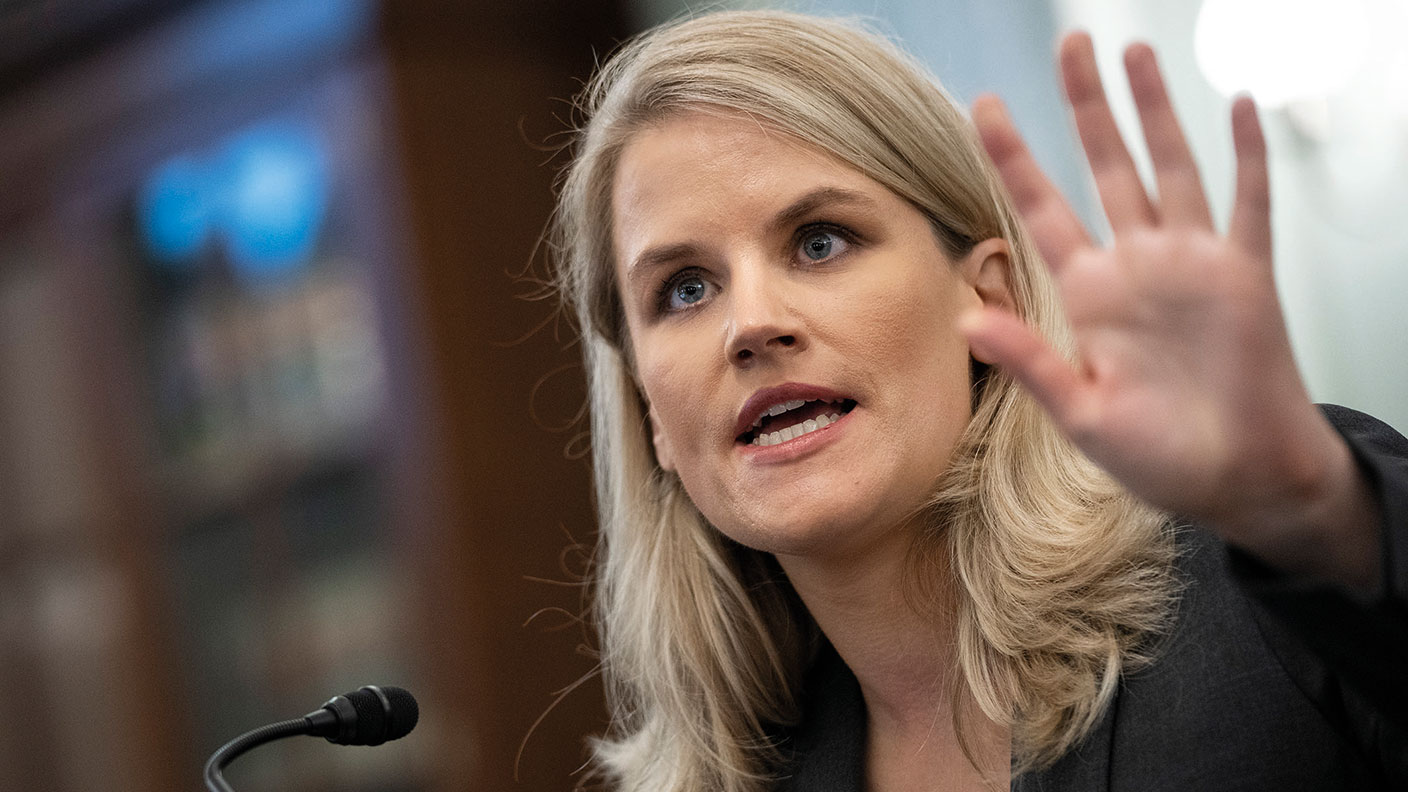Whistleblower allegations – where now for Facebook?
Facebook has come in for some fierce criticism after revelations from a former employee. Just how much damage has been done?

Get the latest financial news, insights and expert analysis from our award-winning MoneyWeek team, to help you understand what really matters when it comes to your finances.
You are now subscribed
Your newsletter sign-up was successful
Want to add more newsletters?

Twice daily
MoneyWeek
Get the latest financial news, insights and expert analysis from our award-winning MoneyWeek team, to help you understand what really matters when it comes to your finances.

Four times a week
Look After My Bills
Sign up to our free money-saving newsletter, filled with the latest news and expert advice to help you find the best tips and deals for managing your bills. Start saving today!
What’s happened?
Facebook’s critics have charged it for years with knowingly causing its users harm, putting profits over safety and intentionally driving user engagement by sowing division. Now a trove of internal documents has been placed in the public domain, which critics say prove those charges. When a former employee, who was a member of Facebook’s own “civic integrity” team, says before Congress that the company’s products “harm children, stoke division and weaken democracy”, it’s hard to ignore. Some of whistleblower Frances Haugen’s most shocking revelations concern harm to children and young teenagers – a factor that changed the game in terms of the bipartisan anger on display when she appeared on Capitol Hill. She was welcomed as a hero, which will no doubt encourage other whistleblowers, whether at Facebook or other Big Tech firms.
What has Facebook done wrong?
The claims are that Facebook’s algorithms deliberately promote divisive and antagonistic content to drive engagement; that it, in effect, tolerates the spread of misinformation for profit; and that it knows about the negative effects social media can have on teenage users’ mental health. One especially damning internal document from 2019 revealed that Facebook’s own research found its Instagram platform to be psychologically damaging for young women in particular. Yet when Facebook founder and CEO Mark Zuckerberg testified before Congress in March, he gave the contrary impression, even claiming that social-media use has positive mental health benefits.
Are there other allegations?
Haugen says the company also knows that its platform is being used to fan the current ethnic violence in Ethiopia, in the same way that it was used – by Facebook’s own admission – in the campaign of persecution against the Rohingya Muslims in Myanmar that ended in mass murder and ethnic cleansing. In Nigeria, fake information on Facebook about intercommunal violence has fuelled a cycle of deadly atrocities. Eighty-seven per cent of the money spent by Facebook on combatting fake news content is in the English language; only 9% of Facebook users globally speak English.
MoneyWeek
Subscribe to MoneyWeek today and get your first six magazine issues absolutely FREE

Sign up to Money Morning
Don't miss the latest investment and personal finances news, market analysis, plus money-saving tips with our free twice-daily newsletter
Don't miss the latest investment and personal finances news, market analysis, plus money-saving tips with our free twice-daily newsletter
What has the reaction been?
The silence from Facebook’s oversight board has been “deafening”, says Ben Marlow in The Daily Telegraph. The creation of a 20-strong independent board of academics, lawyers, activists and prominent journalists was supposed to be a pivotal moment in Facebook’s efforts at self-regulation. It was trumpeted as Facebook’s “supreme court”. The oversight board has asked to meet with Haugen, but Zuckerberg has already made clear the company’s line: that Haugen has painted a “false picture” of his firm and that her claims “don’t make any sense”. The oversight team has conceded that Facebook may not have been “fully forthcoming” and failed to tell them about a secret system for reviewing the accounts of high-profile users. “This humiliating acknowledgment” suggests the board is little more than a PR shield.
What might governments do?
Tighter regulation seems inevitable – for example, governments might require Facebook to share the algorithms that determine what users see. The force of the Haugen revelations is that Facebook insiders already know how to dial down the rancour, but chose not to do so. Congress is considering various options, says the Financial Times – from tightening privacy laws and strengthening the hand of antitrust watchdogs. A sensible legislative innovation would be to set up a sectoral watchdog that licenses and oversees social-media firms in the same way the state oversees financial services. “It is notable that in the highly regulated area of finance that Facebook tried to enter, a co-ordinated response from policymakers and watchdogs around the world rightly forced it to rethink plans for a digital currency.”
What’s the pro-Facebook case?
Some of the criticism is “incoherent” and “tendentious”, says The Economist, and some of the rest is really about the wider internet, not Facebook in particular. Much was made of the research showing that Instagram makes one in five teens feel worse about themselves – but few mentioned the finding that it makes two in five feel better. There is some truth to Facebook’s contention that an overreaction to “unsurprising findings will lead companies to conclude that it is safer not to do such research at all”. From the point of view of investors, one of Haugen’s most important allegations is that Facebook has concealed a decline in its young US users. In particular, she shared internal projections that a drop in teenagers’ engagement could lead to an overall fall in US users of 45% within two years. “Misleading advertisers would undermine the source of nearly all the firm’s sales and potentially break the law.”
What does Facebook say?
It has denied that allegation. But the charge that Facebook misleads investors and advertisers (one which Haugen has now formally reported to US regulators) is potentially extremely damaging. What also damages Facebook as an investment prospect, says Kevin Roose in The New York Times, is that Haugen’s revelations show Facebook not as all-powerful, but as defensive, fearful and fundamentally weak. This is a company that is “losing power and influence, not gaining it, with its own research showing that many of its products aren’t thriving organically” – and executives are driven to almost comical extremes to shore up growth, such as the internal presentation discussing how to “leverage playdates” to drive business among pre-teens. To invert the Silicon Valley jargon, Facebook is right now a “maximum viable product”, which presents a “huge market opportunity” for someone else. It is time to invent new, and better, social networks.”
Get the latest financial news, insights and expert analysis from our award-winning MoneyWeek team, to help you understand what really matters when it comes to your finances.
-
 Average UK house price reaches £300,000 for first time, Halifax says
Average UK house price reaches £300,000 for first time, Halifax saysWhile the average house price has topped £300k, regional disparities still remain, Halifax finds.
-
 Barings Emerging Europe trust bounces back from Russia woes
Barings Emerging Europe trust bounces back from Russia woesBarings Emerging Europe trust has added the Middle East and Africa to its mandate, delivering a strong recovery, says Max King
-
 Barings Emerging Europe trust bounces back from Russia woes
Barings Emerging Europe trust bounces back from Russia woesBarings Emerging Europe trust has added the Middle East and Africa to its mandate, delivering a strong recovery, says Max King
-
 How a dovish Federal Reserve could affect you
How a dovish Federal Reserve could affect youTrump’s pick for the US Federal Reserve is not so much of a yes-man as his rival, but interest rates will still come down quickly, says Cris Sholto Heaton
-
 Three companies with deep economic moats to buy now
Three companies with deep economic moats to buy nowOpinion An economic moat can underpin a company's future returns. Here, Imran Sattar, portfolio manager at Edinburgh Investment Trust, selects three stocks to buy now
-
 Should you sell your Affirm stock?
Should you sell your Affirm stock?Affirm, a buy-now-pay-later lender, is vulnerable to a downturn. Investors are losing their enthusiasm, says Matthew Partridge
-
 Why it might be time to switch your pension strategy
Why it might be time to switch your pension strategyYour pension strategy may need tweaking – with many pension experts now arguing that 75 should be the pivotal age in your retirement planning.
-
 Beeks – building the infrastructure behind global markets
Beeks – building the infrastructure behind global marketsBeeks Financial Cloud has carved out a lucrative global niche in financial plumbing with smart strategies, says Jamie Ward
-
 Saba Capital: the hedge fund doing wonders for shareholder democracy
Saba Capital: the hedge fund doing wonders for shareholder democracyActivist hedge fund Saba Capital isn’t popular, but it has ignited a new age of shareholder engagement, says Rupert Hargreaves
-
 Silver has seen a record streak – will it continue?
Silver has seen a record streak – will it continue?Opinion The outlook for silver remains bullish despite recent huge price rises, says ByteTree’s Charlie Morris